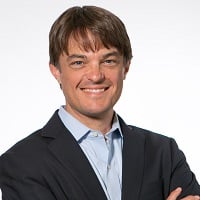Read Pukkila-Worley, MD
By Merin C. MacDonald | Date published: June 21, 2023
June Researcher Spotlight: Read Pukkila-Worley, MD
In this month’s Researcher Spotlight, we highlight the work of Read Pukkila-Worley, MD, an associate professor of medicine in the Division of Infectious Diseases and Immunology, faculty in the Program in Innate Immunity, and physician on the infectious disease consult service.
Dr. Pukkila-Worley is a physician-scientist whose work is broadly focused on characterizing host-pathogen interactions in the intestine, with the goal of discovering new targets for anti-inflammatory and anti-infective therapies. Specifically, he is focused on characterizing how bacteria are sensed by the innate immune system in the intestine, characterizing new mechanisms of immune pathway activation and regulation, and defining how host metabolism affects the ability to survive infection. He is currently the principal investigator on two R01 awards and an R21 award from the NIH National Institute of Allergy and Infectious Diseases. The goal of his first R01, which he successfully renewed recently, is to characterize new mechanisms of immune activation and regulation in the cells that line the intestine. This work follows the discovery of his laboratory that small molecule metabolites derived from infectious microbes are sensed to assess the relative threat of virulent bacteria and activate protective immune defenses. His second R01 seeks to characterize a novel mechanism of pathogen surveillance used by the host to activate innate immune defenses. He proposes that pathogen-induced changes in host cell membrane dynamics are sensed to detect pathogen infection. His R21 examines a neuroendocrine circuit that controls of intestinal epithelial immunity.
Dr. Pukkila-Worley is an enthusiastic mentor and educator. He is the co-course director of “Blood, Immunity and Infections,” a major course that teaches clinical microbiology and infectious disease to first-year medical students. In his lab, he mentors PhD and MD/PhD graduate students, four of whom have or will soon defend their PhD thesis, as well as postdoctoral trainees, undergraduate interns, and research scientists. He advocates for his trainees, champions their learning, and celebrates their collective and individual accomplishments. Of this role, he stated, “Mentoring students and trainees in my lab is a joy of my career. Their hard work and intellect drive our science in a way that is wonderful for me to be a part of.” For his contributions to medical education and mentoring, Dr. Pukkila-Worley was recognized with the 2021 UMass Chan Outstanding Foundational Medical Educator Award and the 2020 UMass Chan Outstanding Physician-Scientist Award. In 2022, he began serving as the director of the Department of Medicine Grand Rounds.
Dr. Pukkila-Worley is also a practicing physician and sees patients on the inpatient infectious disease consult service at UMass Memorial. In this capacity, he teaches clinical infectious diseases fellows and medical students on their 3rd and 4th-year rotations.
Dr. Pukkila-Worley earned his medical degree at the University of North Carolina School of Medicine in Chapel Hill, North Carolina, where he was a medical student research fellow of the Howard Hughes Medical Institute. He completed his Internal Medicine residency and a clinical fellowship in Infectious Disease at Massachusetts General Hospital (MGH). He was then an Irvington Institute research fellow of the Cancer Research Institute at MGH, mentored by National Academy of Sciences member Dr. Fred Ausubel. Dr. Pukkila-Worley joined the faculty at UMass Chan Medical School in 2014.
When asked to reflect on the research community on campus, Dr. Pukkila-Worley commented, “UMass Chan is a truly special place for basic science research and innovation. In particular, we are thrilled to be a part of the community of scientists that study innate immunity and inflammation, which is as rich on our campus as any place in the world.”
Dr. Pukkila-Worley is a valued member of our faculty and we are grateful for his contributions as a physician-scientist and educator in the Department of Medicine.

